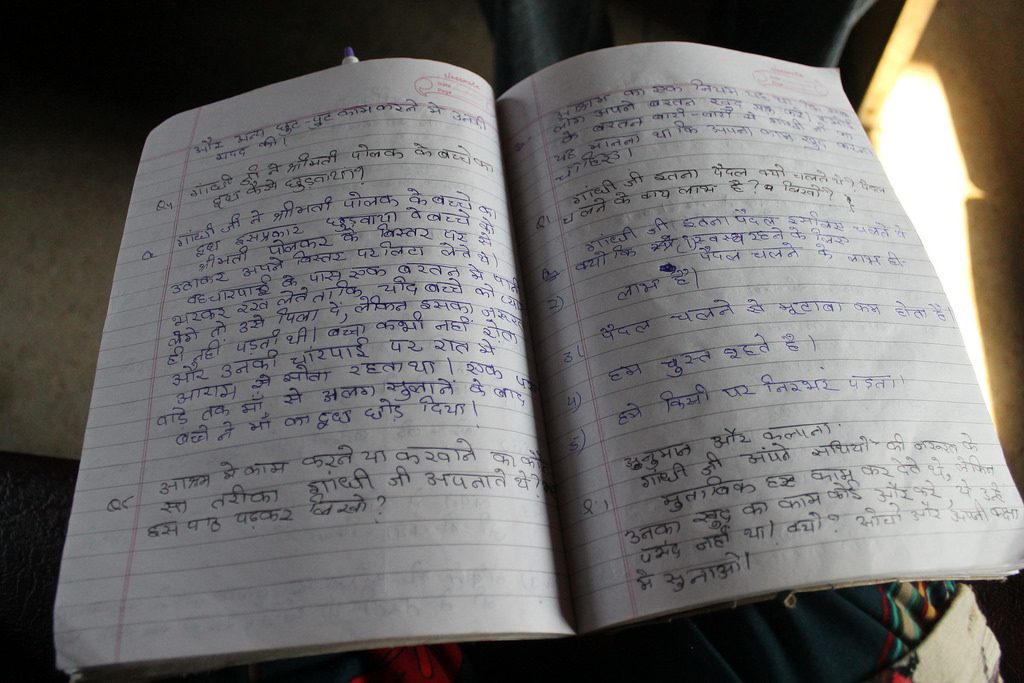
by Namrata Verghese – Follow @browngirlmag
Recently, a college friend pointed out to me that I transform into a different person when I speak to my parents on the phone. My t’s become softer, my r’s become harder. My words end in alveopalatal fizzes, a musical Carnatic cadence I associate with India. She was right, although I hadn’t noticed this before; linguistically, this is called code-switching, a term that perfectly articulates a nebulous identity confusion I’ve always felt but have never quite been able to pinpoint before.
Indian immigrants face a different set of linguistic obstacles than other immigrant groups do; unlike many other Asian immigrants, most Indian-Americans eschew Western nomenclature in favor of naming their children traditional names infused with religious significance: Karan, Kiran, Rajesh, Rajeshwari—you get the gist. However, studies have shown that most second-generation Indian immigrants have, at best, a tenuous grasp of their mother tongues. My siblings can barely understand Malayalam, let alone read and write it. I could speak the language, but I did something worse: I mangled it on purpose.
Most people can’t pronounce my name properly—the “tha” sound in “Namrata” is one that does not exist in the English phonetic system. So I catered my name to American tongues, flattening its beautiful interdental t, rendering it 2D and unremarkable. To professors, I’m “Nam-uh-rah-dah.” To childhood friends, I’m “Nimmy.” Worst of all, perhaps, to Starbucks baristas, I’m “Annie.” Bewilderingly, I felt embarrassed of my name—but also deeply protective of it. This angst of the second-generation immigrant is nothing new; we are forced with the burden of representation without the pride of ownership, and this conflict frequently morphs into a pronounced identity crisis. However, one factor we consistently underestimate in this psychological confusion is language.
Extant psycholinguistic literature illustrates that language is central to identity. Syllogistically, then, our blurry, undefined relationship with our mother tongues shape, in part, the identity confusion prevalent in many second-generation immigrants. To combat that, we as a culture have changed course: if we cannot master our languages, we will master theirs. When I won my fifth-grade spelling bee against blonde-haired-blue-eyed Maddy, my delight wasn’t just about winning, but about winning over a white person—about beating white people at their own game, at their own language. This is the power language holds over us; this is the validation we feel when we master English to the point where we are objectively better at it than its creators: we feel as though, finally, we have proved that we deserve to be here. That’s why, year after year, Indian middle-schoolers take home the Scripps National Spelling Bee prize. For the assurance that, yes, we are here. Yes, we are worthy. Yes, we belong.
In our fervor to prove ourselves, however, we fall dangerously close to a trap Abena P.A. Busia articulated so beautifully in her poem “Caliban”:
This tongue that I have mastered / has mastered me; / has taught me curses / in the language of the master / has taught me bondage / in the language of the master. / I speak this dispossession / in the language of the master.
Instead, ideally, the Indian-American relationship with language should resemble more closely what Kamala Das outlines in her luminous poem, “An Introduction”:
The language I speak / Becomes mine, its distortions, its queernesses / All mine, mine alone. / It is half English, half Indian … / It is as human as I am human, don’t / You see?
Because ultimately, until we can reconcile our ancient language traditions with our new ones, the Indian-American linguistic confusion will continue to bleed into all aspects of our hyphenated identities. Nowadays, I make sure that, when I introduce myself, I enunciate every beautiful, ridiculous, unique syllable of my name. Nam-ruh-tha. They may not be able to say it, with its fricative hiss and its interdental “tha.” But that’s okay, because I can. And, finally, after two decades on earth, I can truthfully say this: I’m proud that I can.
 Namrata is a rising junior and Robert W. Woodruff Scholar at Emory University, pursuing a double major in English/creative writing and psychology/linguistics. An aspiring writer, her work has appeared or is forthcoming in storySouth, Litro Magazine, NY Literary Magazine, VoiceCatcher, Paper Darts and elsewhere. She loves reading, coffee and Bollywood music (and combining all three at the same time!).
Namrata is a rising junior and Robert W. Woodruff Scholar at Emory University, pursuing a double major in English/creative writing and psychology/linguistics. An aspiring writer, her work has appeared or is forthcoming in storySouth, Litro Magazine, NY Literary Magazine, VoiceCatcher, Paper Darts and elsewhere. She loves reading, coffee and Bollywood music (and combining all three at the same time!).




